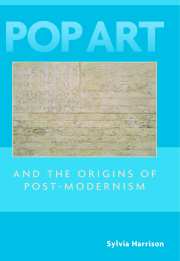Book contents
- Frontmatter
- Contents
- Introduction
- PART ONE THEORETICAL FRAMEWORK
- PART TWO “SOCIAL” CRITICS
- PART THREE “PHILOSOPHICAL” CRITICS
- 5 Barbara Rose: Pop, Pragmastism, and “Prophetic Pragmatism”
- 6 Max Kozloff: A Phenomenological Solution to “Warholism” and Its Disenfranchisement of the Critic's Interpretive and Evaluative Roles
- PART FOUR “CULTURAL” CRITICS
- Conclusion
- Notes
- Index
5 - Barbara Rose: Pop, Pragmastism, and “Prophetic Pragmatism”
from PART THREE - “PHILOSOPHICAL” CRITICS
Published online by Cambridge University Press: 23 July 2009
- Frontmatter
- Contents
- Introduction
- PART ONE THEORETICAL FRAMEWORK
- PART TWO “SOCIAL” CRITICS
- PART THREE “PHILOSOPHICAL” CRITICS
- 5 Barbara Rose: Pop, Pragmastism, and “Prophetic Pragmatism”
- 6 Max Kozloff: A Phenomenological Solution to “Warholism” and Its Disenfranchisement of the Critic's Interpretive and Evaluative Roles
- PART FOUR “CULTURAL” CRITICS
- Conclusion
- Notes
- Index
Summary
In the previous section we have seen how the post-modernist features of the critical responses of social critics to pop can be identified by the recourse to a sociological model of post-modernism, a model that posits a relationship between post-modernity, the characteristics of which are reflected in pop art, and post-modernism. This section will examine the responses of two further critics, Barbara Rose and Max Kozloff. While neither critic ignored pop art's patent relationship to the post-war urban societal form (post-modernity), they accounted for the post-modernist features of pop primarily on philosophical grounds. In the pursuit of a means of theorizing pop and other sixties' art that was inadequately accommodated as well as negatively evaluated by Greenbergian formalism – and, hence, by its underlying foundationalist beliefs – Rose and Kozloff formulated systems underpinned by provisional values that were responsive to the value-system of each work and, in the case of Kozloff, of the critic or experiencing subject. These were predicated on either the tenets of philosophical pragmatism in the case of Rose, or with Kozloff of phenomenology.
Pragmatism and phenomenology are linked by their common recognition of the intentional ties that bind one to the world, as well as the role played by these in the constitution of knowledge about that world.
- Type
- Chapter
- Information
- Pop Art and the Origins of Post-Modernism , pp. 115 - 145Publisher: Cambridge University PressPrint publication year: 2001



